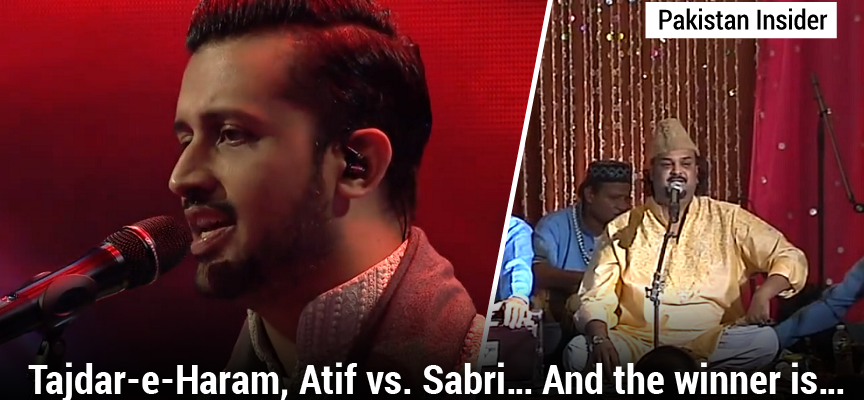Coke studio 8 is garnering rave reviews and – as is the norm – lighting up some controversies on the way. The two most notable being the Tajdar-e-haram, old vs. new debate; and the Umair Jaiswal’s rock star moves.
Today I am going to pen down my two cents on the Tajdar-e-haram debate.
A lot has already been said on this already with people comparing the Sabri brothers 70’s version to Atif’s reimagined one.
Some claim that it was a mistake on Atif’s part to have attempted a rendition of the magnum opus that the Sabri brothers belted out in 1975. Some however, can’t stop talking about how wonderful the new version is.
The divide is so large that one comment I read stated “Atif / Coke Studio have the distinct privilege of butchering one of my favorite qawwalis. It was a pathetic effort.” And another one just below it claimed “I was not expecting it from Atif. I think he was superb.”
I kind of liked the new version myself, but that in no way means that the original sucks. The original is a classic in every right.
Times have changed
The original Tajdar-e-haram was sung by the Sabri brothers in 1975, some forty years ago. That’s a long time and in these forty long years everything about music and the Pakistani music industry has changed.
Today the music scene is very different and people now are ready to want, accept and like what Atif has done with a classic for the plain reason that it’s fresh and in tune with the times.
I will go as far as to say, why compare it with the original? Both are different. The biggest difference being that the Sabri brothers immortalized Tajdar-e-haram as a qawwali and the one that Atif crooned is a song.
How can you compare a song to a qawwali? It’s like comparing oranges and apples. Why can’t I like both apples AND oranges?!?!?!?
Or what if I just like Apples…so?!?!?
Yes, Atif’s song has similar lyrics, but that’s pretty much where the similarities end.
The following comment I got off the net sums up what I have to say perfectly:
“Well I heard the original but the things Strings have really modified the Kalam according to today’s generation music taste ! . The effort might seem as not good for those who have grown up listening to NFAK or Sabri Brothers but for the modern music and especially the current fusion of sufi music with Rock , this was the best rendition in this decade of Pakistani music after Dastaan-e-Ishq by Ali Zafar ! . I even heard every one in my campus mimicking and singing lines of this qawalli and that’s how I knew how much it has been popular with this generation”
If anything, Atif has just blown life back into Tajdar-e-haram and maybe even qawwali by reintroducing it to today’s generation. A generation who might not even have heard of the Sabri brothers before this debate.
Oh! By the way, the Kalaam could be tantamount to Shirk!
Aha! Didn’t see this one coming.
Well if you listen to the ‘kalaam’ it is clear that the singer is making dua (supplication) to the Prophet (SAW) instead of Allah and that in every which way is deemed shirk.
I know I am treading a thin line here but it’s not just me, a lot of people claim such kind of kalaam to be tantamount to shirk. I am no scholar, but to me it does make sense. We should not make dua to the prophet (SAW), even if it is for the sake of qawwali.
OK! Now that I have triggered a religious debate I will end this post right here and prepare for the onslaught of comments! ;)





Guys I realy love this song ..and now it is one of the most favorite song ……I listen this song eight times or more in a day…..sabri brother has made the lyrics very motivated and atif bro has sung it very well…..thanks Atif bhaijaan for this song….
I totally believe that it is a shirk and it should be stopped. Our youth and others just like the music and beat and no one realizes the words and meanings. May Allah bless us all and guide us to the right path. Ameen
I completely agree to Sameer and appreciate your daring to accept this fact. For all the others to understand that to ask from other than Allah(ST) is shirk you dont have to be a scholar or aalim. Just be a Muslim and read Quran and its translation atleast once in your own language.
Ignorant! If you are not an aalim and have no knowledge about things, then don’t proclaim such non sense
yeah bro… i agree with you with shirk point…
Well for me , atif’s tajdare haram is fantastic and i would support u on the statement which portrayed a messege of shirk.
hay you fool people . you all are wrong
you like atif aslam voice because you heard him first
One thing you fool guys dont noticed that atif is compairing a great quvalle with a song.
atif aslam not read the qualle but he sungs it
you are the fans of atif aslam thats way you choose him as a winner
But a bitter truth is that atif aslam cant face the voice of sabri brothers they were the best in every way
i suggested you fool people to her the best quvali in the whole world ever BALA GUL U LA PAY KAMA LAY HEE
That is read by sabri brothers
SABRI BROTHERS ARE THE BEST